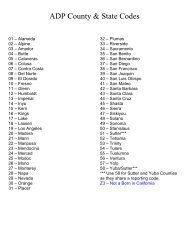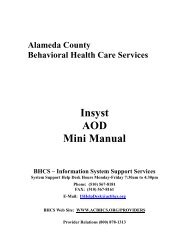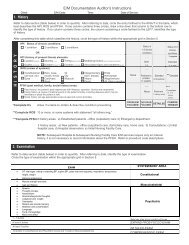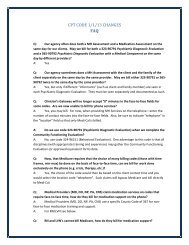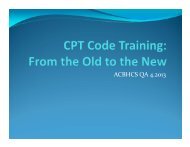Juvenile Competency Protocol - Alameda County Behavioral Health
Juvenile Competency Protocol - Alameda County Behavioral Health
Juvenile Competency Protocol - Alameda County Behavioral Health
You also want an ePaper? Increase the reach of your titles
YUMPU automatically turns print PDFs into web optimized ePapers that Google loves.
De facto good cause would exist for a reasonable continuance if an attorney needs<br />
time to secure his/her own expert to render a second opinion. The court must limit the<br />
amount of time for the continuance to avoid delay. If the attorney securing the second<br />
opinion does not work with haste, the court may proceed to trial without counsel’s<br />
expert(s). Also, the court should be prudent in continuing trial dates any longer than<br />
absolutely necessary when the minor is in custody.<br />
Trial Judge<br />
There is no requirement that the competency hearing be held before the same<br />
judge who declared a doubt about the minor’s competence to stand trial. People v Hill<br />
(1967) 67 C2d 105, 113; People v Lawley (2002) 27 24 th 102, 133-134. [Adult cases.]<br />
Presumption of Competence; Burden of Proof<br />
The minor is presumed competent at the start of the competency hearing. The<br />
burden in on the minor to prove his or her incompetence to stand trial by a preponderance<br />
of the evidence. W&I Code 709; Penal Code §1369(f0; Cal Rules of Ct 4.130(e)(2);<br />
Medina v California (1992) 505 US 437; People v Medina (1990) 51 C3d 870, 885<br />
(presumption and burden of proof under Penal Code §1369(f) do not violate due process);<br />
People v Samuel (1981) 27 C3d 489, 505, CALCRIM 3451. A preponderance of<br />
evidence is “that which preponds,” or is more likely than not, or is more then 50 percent<br />
true.<br />
However, if the defense puts on no evidence of the minor’s incompetence and the<br />
prosecution chooses to put on such evidence, the burden of proof falls on the prosecution.<br />
Penal Code §1369(b)(2); Cal Rules of Ct 4.130(e)(2); People v Mixon (1990) 225 CA3d<br />
1471, 1484 n12 (burden of proof falls on party who challenges presumption. [<strong>Juvenile</strong><br />
and adult statues, cases, and Rule of Court.]<br />
When neither the prosecution nor the minor seeks a finding of incompetence, the<br />
trial court may take the initiative and assume the burden of producing evidence of<br />
incompetence. People v Skeirik (1991) 229 CA3d 444, 459. [Adult cases.]<br />
Presentation of Evidence<br />
Typical order of presentation:<br />
1. Defense counsel goes first because they carry the burden of proof.<br />
The minor’s attorney offers evidence of the minor’s mental<br />
incompetence, if the attorney has such evidence, and chooses to do<br />
so. Penal Code 1369(b)(1).<br />
2. If defense counsel does not offer evidence of incompetence, the<br />
prosecutor may do so. Penal Code 1369(b)(2).<br />
3. If defense counsel put on evidence of incompetence, the prosecutor<br />
next offers evidence of minor’s present mental competence. Penal<br />
Code 1369(c ).<br />
4. Each party may offer rebuttal testimony, unless the court, for good<br />
reason and in the furtherance of justice, also permits other<br />
evidence in support of the original contention. Penal Code<br />
1369(d).<br />
15 Superior Court, <strong>Alameda</strong> <strong>County</strong>, California<br />
<strong>Juvenile</strong> Court, <strong>Juvenile</strong> <strong>Competency</strong> <strong>Protocol</strong><br />
March 1, 2013



